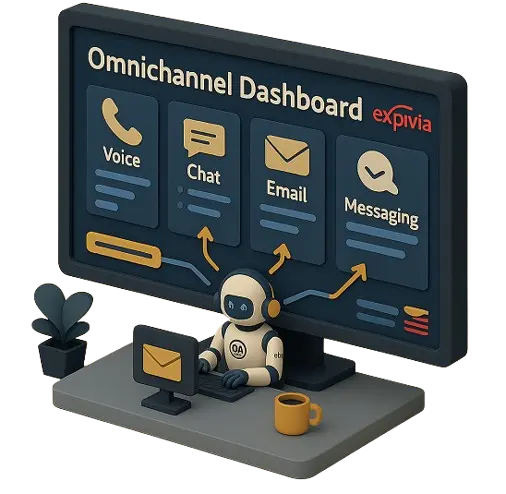AI That Works. Agents You Trust. A Partner in the USA.
At Expivia, every agent sits side-by-side with real-time AI Auto QA, Agent Assist, Analytics, and Auto Summarization all built into their daily workflow. No outsourcing. No disconnected tools. Just faster, smarter, U.S.-based support that actually works.

Built for Precision. Trusted for Performance. Powered by AI.
What We Actually Do And Do Well
We provide top-tier, omnichannel customer service solutions designed to enhance engagement and drive business growth. From inbound and outbound marketing to AI-powered self-service technology, our expert team ensures seamless customer interactions across all touchpoints.
Modern Customer Support
Modern Customer Support
Smarter Self-Service
Smarter Self-Service
Customer Engagement is Our Expertise
We create seamless customer interactions through real-time AI, automation, and human expertise — driving faster resolutions and better outcomes across every channel.
Fast, Seamless Support
Fast, Seamless Support
Secure + Proven AI
Secure + Proven AI
Tech That Works with People
Tech That Works with People

The Expivia Difference: Real Agents. Real AI. Real Outcomes.
Delivering seamless, AI-powered customer interactions that enhance engagement, improve satisfaction, and drive business success.
- Omnichannel With AI Routing
We provide intelligent solutions that adapt to customer needs, ensuring seamless interactions across every digital touchpoint.
- AI That Simplifies, Not Complicates
Our intuitive technology and real-time analytics empower businesses to optimize performance effortlessly.
Digital Engagement: A Profitable Technological Force
Pre-Sale Starts July 10
Need More Information?
Unlock the future of customer engagement with cutting-edge AI solutions that elevate your brand and maximize business success.
A Full-Service AI-Powered Omnichannel Contact Center
Expivia blends 15 years of U.S.-based contact center experience with modern AI tools that actually work. Our agents work hand-in-hand with real-time technology like Auto QA, Agent Assist, Summarization, and advanced analytics — all built into the daily workflow to deliver seamless support at scale.
- Assess Performance in Real Time
Track KPIs and coach smarter with 100% AI-scored QA and real-time insights — without sifting through random samples.
- NICE CXone Experts
We’re the only U.S. outsourcer invited to the NICE Customer Executive Council. Our team builds with CXone better than anyone else.
- Integrate Seamlessly
Whether it’s your CRM, helpdesk, or knowledge base , we plug in fast and clean, without disrupting your process.
- Built for Tomorrow
Future-proof your CX with fast rollouts, AI optimization, and scalable omnichannel support , all backed by real humans.
- AI-Powered Solutions
From smart routing to auto-summarization, agent assist to deep analytics — we embed real-time AI where it matters most.
- Gain Insights on Every Call
Every interaction generates actionable data: trends, coaching flags, compliance triggers — all ready for your team to use.
AI That Works. Agents You Trust. A Partner in the USA.
AI That Works. Agents You Trust. A Partner in the USA.
At Expivia, we integrate AI technologies like Auto QA, Agent Assist, Sentiment Analysis, and Summarization into the workflows of our U.S.-based agents. This enables faster, smarter, more personalized customer interactions. Unlike traditional outsourcing with disconnected tools and offshore teams, our model unifies human expertise and AI in real time. The result is a scalable, efficient experience that drives real business impact. With Expivia, you’re not just getting a contact center you’re gaining a partner focused on innovation and results.


